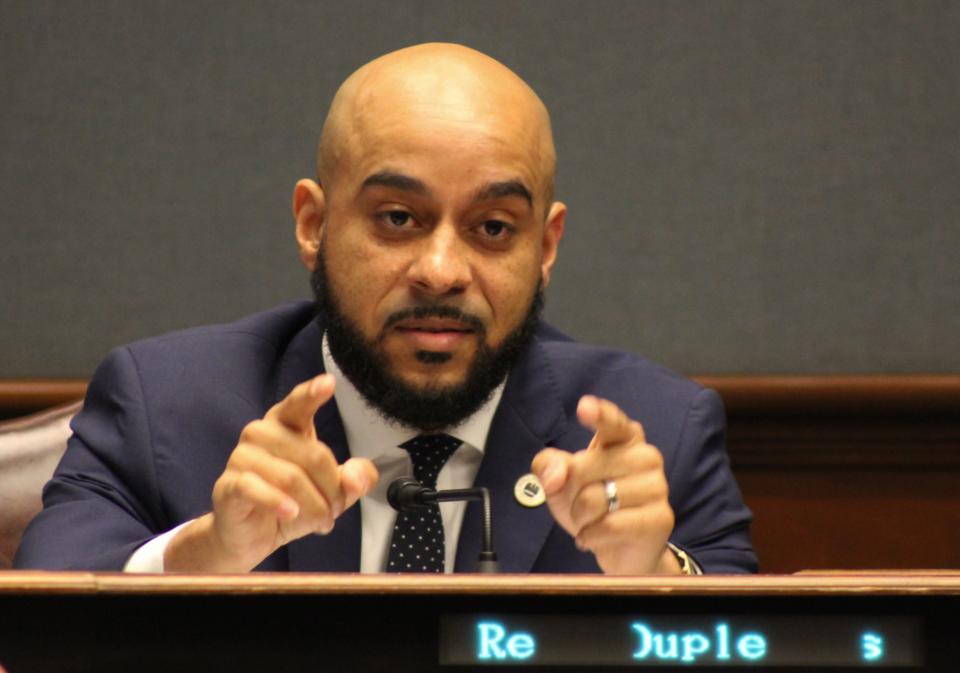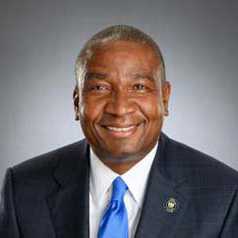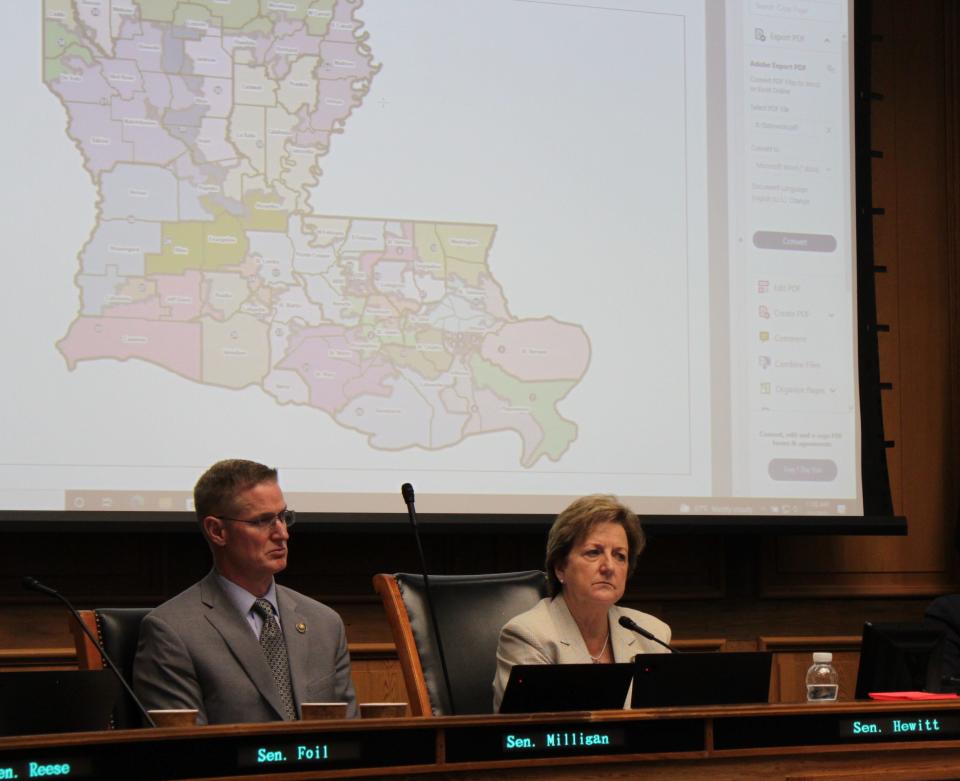How Louisiana could be affected by a Supreme Court decision in another state
- Oops!Something went wrong.Please try again later.
BATON ROUGE — As it became clear that Republican leaders planned to pass redistricting maps that would not expand minority seats in Congress or the Louisiana Legislature, Black lawmakers said they had two fallbacks — possible vetoes by Gov. John Bel Edwards or lawsuits.
Now both of those options seem a bit shakier.
The Louisiana House and Senate both passed congressional redistricting plans last week by vote margins that would be big enough to override vetoes by Edwards, a Democrat, if the Republicans could muster those votes again.
Analysis: Legislature to pass congressional map with only one Black district
And last Monday, the U.S. Supreme Court delayed hearing a suit in a similar redistricting fight in Alabama in a move that legal experts say could hint at less court intervention to support minority claims in the future.
In a 5-4 vote, the court’s conservative majority let a redistricting plan passed by the Alabama Legislature stand through this fall’s midterm elections even though an appeals court had ruled that the law may have violated the Voting Rights Act of 1965 in failing to provide for a second minority-majority congressional district.
The Supreme Court, which has trimmed back parts of the voting-rights law in recent years, said it would consider the merits of the Alabama case later. But that is not likely to happen until after the November elections, which will decide the balance of power in Congress.
More: U.S. Supreme Court stays lower court decision blocking Alabama congressional maps
How would the balance of power be affected?
Republicans and Democrats have been fighting across the country to hold or gain congressional seats through the redistricting process. So if lawsuits challenging the decisions are delayed in many states, that could leave the party with the most power — Republicans in red states like Louisiana and Alabama and Democrats in blue states — in the driver’s seat in those areas.
Peter Robins-Brown, the executive director for Louisiana Progress, an advocacy group, said the Supreme Court decision to let the GOP’s Alabama redistricting map stand for now is likely in Louisiana to “embolden those who were already planning to submit a map that would end up in court and make folks who were planning to challenge those maps feel a little worse.”
Others on the Democratic side remain hopeful that the setback will be temporary.
The Supreme Court has not made any real legal conclusions on this at this point,” Rep. Royce Duplessis, D-New Orleans said. “So I don't think the door is closed.”

Louisiana is unique for a state in the Deep South, having both a Republican-controlled legislature and a Democratic governor.
Although Edwards has not explicitly stated which maps he would or would not veto, he has said that he thinks that it would be fair for two of the state’s six congressional districts to be majority Black. He later pulled back slightly, saying that minority voters had to at least be capable of influencing elections in the second of those two districts.
Why redistricting matters: Will Louisiana's Senate seats reflect its minority population?
Black leaders believe that, with Blacks making up about 33% of Louisiana's population, they should have a good chance to elect two of the state’s six congressmen. The current maps only provide for one Black-majority district, and that would remain the case under the GOP bills.
Could a veto be overridden?
Black lawmakers also are seeking more seats in the state Senate and House, while the Republican bills also would keep those totals the same as there are now.
State Sen. Cleo Fields, D-Baton Rouge, said he had already asked Edwards to veto the Republican bills.

“I would hope that the governor vetoes it, even if it's overridden,” Fields said, “because I just think it's the right thing to do, and it’s the right place for him in history. It is wrong. Just because you have the power to pass it doesn't mean that you should, and I think the majority is passing a plan that's wrong.”
A successful veto would force Republican leaders to negotiate further. But if lawmakers override a veto, Fields said, Black lawmakers and civil rights groups will continue to fight in court.
“The only way the minority can get some relief is through the courts and it's always been that way. I was hoping that day would change but it's not gonna change without the assistance of the court.”
Last week, the state Senate voted 27-12 to advance a plan that would leave Louisiana with just one majority-Black congressional district. The House passed a similar measure by a 70-33 margin.
That was one more vote than needed for the GOP plan in the Senate, and the exact number needed in the House, to reach the two-thirds vote threshold in both chambers required to override a veto.
The votes could still be fluid, though. In the House, two Democrats, Rep. Francis Thompson of Delhi and Rep. C. Travis Johnson of Vidalia, crossed over to support the Republican congressional plan, and two independents voted with the Republicans.
Two Republicans, Rep. Blake Miguez, R-Erath, and Rep. Beryl Amedee, R-Gray, voted against the bill out of concern that it would split St. Martin Parish into two congressional districts, though they could return to the fold if that issue is resolved.
Duplessis said in an interview that he thought he could persuade one of the lawmakers who voted with the Republicans to vote with the Democrats on a vote to override a veto.
Last summer, Republicans passed a bill to prevent transgender girls from competing in school sports, with 78 yes votes in the House and 29 in the Senate. But after Edwards negotiated with some of the lawmakers, efforts to override his veto failed, with Republicans losing 10 of the votes in the House and two in the Senate.
“Last year, that anti-trans bill got 78 votes when it passed, and then the governor and his folks were able to bring that down to a non-veto override,” said Robins-Brown of Louisiana Progress.
“So as I've been talking to people to get their personal take on what the odds are of a veto override” after the House vote on the congressional maps Friday night, he said, “I’ve found that people are more encouraged after that vote that he will veto it and it will be hard to override the veto.”
“I would say at this point I think that it's very likely that he vetoes a congressional map, and personally, I would put it about a coin flip, like really 50/50 whether that veto gets overridden or not,” Robins-Brown added.
Would the current maps really affect representation?
Sen. Sharon Hewitt, R-Slidell, and Rep. John Stefanski, the chairpeople of the Senate and House committees leading the redistricting effort, both said last week that if the Legislature created two majority-Black districts, the population of each would be only 51% to 53% minority. They said white candidates could possibly win both districts if enough Black voters did not turn out to vote.

State election statistics show that in recent major elections, the percentage of registered white voters who went to the polls was higher than the percentage of registered Black voters.
When Edwards won re-election in a runoff in 2019, 52.8% of registered white residents voted, compared to 50.2% of registered Black voters. In the 2020 presidential election, the contrast was starker, with 74.5% of registered white citizens voting versus only 63.1% of Black voters.
Black leaders said, however, that if Black voters felt their candidates had a better chance to win, they would turn out in greater numbers.
The Alabama case was the first to reach the Supreme Court during the current redistricting cycle.
Blacks make up 27% of Alabama’s population, but only one of the state’s seven congressional districts is majority-minority. That district is packed with 63% Black voters. Democrats were suing for this district to be split in two so that Black voters would have a greater chance of electing a second minority congressman.
The three-judge appeals court panel, which included two appointees of President Trump, found that the maps diluted Black votes and were in violation of the Voting Rights Act.
In the 5-4 vote, the Supreme Court wrote that the lower court’s requirement for Alabama to draw a new map comes too close to the 2020 primary election primary and could confuse voters.
More: Voting rights concerns sparked after Supreme Court's ruling stalling new mostly Black district
Justices Brett Kavanaugh and Samuel Alito, in a concurring opinion, wrote that “the stay order does not make or signal any change to voting rights law.”
But several national legal experts have said that since 2013, the Supreme Court has been whittling away at the Voting Rights Act, and that a majority of the justices may not be as sympathetic to minorities on voting rights as some previous justices have been.
Dave Wasserman, a congressional analyst for the non-partisan Cook Political Report in Washington, D.C., said Connecticut just became the latest state to adopt a new congressional map based on population changes in the 2020 Census.
New boundaries have been adopted for 322 House districts in these states. Under the new lines, President Joe Biden would have carried 182 of the districts based on the vote totals in those areas in 2020, Wasserman tweeted recently. That would mark an increase of six districts leaning Democratic.
Most of the 11 states still working redistricting tilt Republican, Wasserman said, with Biden carrying only 48 of the 113 seats in 2020.
Salena Ali also contributed to this story.
This article originally appeared on Lafayette Daily Advertiser: Louisiana redistricting: Could U.S> Supreme Court take up lawsuits?

